DAVID HENRY HWANG INTERVIEW
It's OK to be Wrong and/or It's OK to be Hwang
Presentations of idiosyncratic history pageants with
a sense of humor and musicality
A Creative Soul, Successful Playwright, Screenwriter and Librettist with
All the Work He can Handle
THEATER ABOUT
HISTORY
Through many of David's works, he has included and/or
addressed various issues embedded strategic elements from the histories
of the Asian/Asian Pacific American communities. Prominent writers/advocates
such as Helen Zia, Yuri Kochiyama, Ronald Takaki, Malcolm X and many others
have stressed the need to know and learn from our past - successes and/or
failures.
MIH
- MISSING IN HISTORY" is what Helen
Zia (a prominent activist and book author) stated about the
Asian/Asian Pacific American communities. She adds that "I've been
struck time and again by how little is really known about us (Asian
Pacific American communities) and the America we are pa rt
of; how the rich textures of who we are, why we are here,
and what we bring to America remain so absent from the picture.
But a community as large, diverse, and dynamic as the Asian American
and Pacific Islander peoples cannot stay on the edge of obscurity,
frustrated by images that have rendered us invisible and voiceless,
while other American communities wonder why we are at the center
of key issues of the day." |
David's plays have provided one viable option to prompt/motivate
Asian/Asian Pacific Americans who sadly don't know and/or have learned
at a late stage the need to discover their past heritage that they (ideally)
should have known for a long time - along with helping non-Asians acquiring
a better understanding of the many unique cultural tapestries that interwoven
within these many Asian/Asian Pacific American communities. His efforts
are to be complimented and supported - whether or not you agree or disagree
with the artistic results. This section of the interview will highlight
his journey to share these invaluable stories to the general public.
DANCE AND THE RAILROAD
| |
WELLY
YANG |
| |
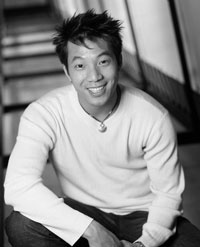 |
|
| Click
HERE
for Bio Info |
|
He
(Welly Yang) says he didn't know a lot of the historical context
in the show ("Making Tracks" - The plot is about
a young Asian American rock musician uncovers the stories behind
his family’s six-generation struggle to find a voice in America.)
until fairly recently.
"There's
the ethnic studies types who know it all," he says, "but I had
a fairly elite education and it wasn't until that education was
over that I discovered a lot of this on my own. I didn't know
the history of Asian immigration, that they weren't even allowed
to immigrate for a quarter of the nation's history or something
ridiculous like that. I had never even heard of that."
Discover APA history by clicking HERE
Click HERE
for more info>>>>
|
"No one will know who we are
until we know who we are" (Malcolm X ) |
|
| |
Brief
Background |
| |
Welly
Yang is a 2nd generation Taiwanese American graduate with honors
in Political Science/International Relations from Columbia University.
Click
HERE
for More Background
Information |
US ASIANS: With Welly Yang's Making
Tracks serving
as his platform to discover the history of the Asian Pacific
American communities in the United States
that he never knew till recently,
why do you feel
that our communities have failed to utilized your plays
such as
"The Dance and the Railroad"
as a starting point?
| As
long we don't know our history and other's history, there
will be no positive interactions or understandings. (Yuri Kochiyama) |
DAVID HENRY HWANG:
I think "Dance
and the Railroad" has been staged a fair amount in APA theatres, but
it is a complicated work to produce, demanding actors with a very specific
expertise. That said, I do think a new generation would enjoy seeing it!
US ASIANS:
Outside of Welly Yang's (of NYC's "2nd Generation Theater Group) and John Woo/Chow Yun-Fat's upcoming film project, isn't it ironic that one of the major achievements of the West (laying the tracks for the Transcontinental Pacific Railroad) for Chinese Americans hasn't been explored more often?
DAVID HENRY HWANG:
It's certainly a great subject for a film, and I think it's only a matter of time before we see one. In fairness, we haven't seen a film about the building of the Railroad from the Irish side, either. As you probably know, I wrote the first few drafts of "Battle of Ono," as my first screenwriting job, back when the legendary HK director King Hu was attached to it. Perhaps, after 25+ years, this project will finally get made!
US ASIANS:
There's a greater sadness recognizing that the owners of the Transcontinental Railroad didn't want any of the Chinese laborers in the pictures that were taken, especially noting that in the 2005 GM Transportation commercial takes place at the meeting of the railroads with all the executives/laborers in the commercial are white. Why do you think that this "slight" is allowed and/or addressed by any APA organizations - could it be that many within the Asian/Asian Pacific American communities don't know the truth?!?!?
DAVID HENRY HWANG:
Quite possibly. Americans aren't so good with history in general, including APAs.
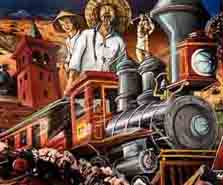 |
|
|
Chinese
Railroad Workers |
|
US ASIANS: Acknowledging that many
have wondered where are the great roles for Asian male actors and the
expressed interest of people such as John Woo/Chou Yun-fat in finding
a vehicle focused on the Chinese working on the transcontinental railroad,
what things do you feel need to happened to bring "Dance and the Railroad"
to the big screen?
DAVID HENRY HWANG:
I think "Dance
and the Railroad" would have to be substantially reconceived to serve
as a satisfactory action vehicle. That said, I would love to try my hand
at adapting it!
US ASIANS: Do you find it ironic that
with the current immigration patterns of the Chinese/Asian communities
creating large group of people that are sorting out their respective pasts
while confronting new identifies and uncertain futures in America, the
issues described and debated within your production are surprisingly more
relevant?
"The
history of Asian Americans offers all of us an opportunity to carry
into the coming century a larger memory of American's past"
(Ronald Takaki) |
DAVID HENRY HWANG: Given the influx of relatively
recent immigrants into our community, it's not surprising that these issues
are still relevant.
US ASIANS: With the ongoing interest
in musicals in theater, combined with Hollywood's fast-growing interest
in Asian theater from India, China, South Korea, Hong Kong and Japan - what
would be the obstacles in bringing your play that creates a mixture of Eastern
and Western theater while incorporating the nonrealistic modes of Chinese
Opera?
| |
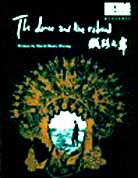 |
| |
Dance
& the Railroad |
| |
Story
of two Chinese labourers working on the Transcontinental Railroad
and marks a historical episode in U.S. history.
|
DAVID HENRY HWANG: At this point, a major "Dance
and the Railroad" revival could probably happen if the right actors were
identified. More specifically, I have begun to explore the idea of bringing
"Dance and the Railroad" to Broadway
if a certain bankable Hong Kong actor were interested.
US ASIANS: Do you long and/or seek
collaborative relationships with your actors such as what happened with
John Lone and Tzi Ma in "The Dance and
the Railroad?" How did this relationship help seamlessly integrate
the Eastern and Western theater elements? What was the creative motivation
of utilizing Chinese opera techniques within this production - could it
be your hope to form an authentic Asian American format?
DAVID HENRY HWANG: John and Tzi, and their expertise
in Chinese opera and dance forms, were instrumental in the conception
and development of this show. I was, in fact, consciously trying to develop
a new, Asian American form. I do like making work for specific actors,
and have several ideas for shows in the future built around certain performers
I admire.
FAMILY DEVOTION
US ASIANS:
Do you find it ironic that the ideas and issues
(affluent immigrant families living hyphenated lives) expressed in your 1981 production Family Devotions has even greater significance in 2005?
DAVID HENRY HWANG:
It reflects the extraordinary 180-degree shift over the past few decades in some of the ways Asians are perceived in America.
|
1000 Airplanes on the Roof |
|
US ASIANS: Could
you describe the ultimate freedom in participating in the creation
of this science-fiction multimedia drama with composer Philip Glass
and scene designer Jerome Sirlin - recognizing that the parameters
of a finite theme and mode of communication are limit by any traditional
presuppositions?
DAVID HENRY HWANG: This
was my first experience with musical theatre as such. I set out
to write a piece that favored poeticism over linear storytelling,
but ended up with a fairly straightforward narrative, after all.
Over the years, I've found that my bent towards telling a story
the audience can follow prevails, even when working with more avant-garde
artists and in less linear forms. It seems that composers, at least
those who choose to work with me, appreciate a librettist who can
tell stories in a relatively traditional fashion. |
|
US ASIANS:
With the current issues with Mainland China/Taiwan and the United States heightening the continuing conflicts of identify had background, what do you feel are the obstacles are in utilizing your play as a means to review/examine the issues by today's audiences - American and Chinese/Asian Pacific American?
DAVID HENRY HWANG:
I frankly feel that the play is probably one of the least "finished" of my works. If I had the time and inclination, I'd give it a rewrite!
US ASIANS:
Do you find it ironic and/or tragic that your play examines a Chinese American family through the lens of a television sitcom and still it is a very rare occurrence - with Margaret Cho's "All American Girl" being the only example?
DAVID HENRY HWANG: It was an impressive feat to
actually get "All American Girl" on a network schedule. It's a shame
the writing/producing end wasn't more skillfully handled, but it's incredibly
difficult to make a good anything!
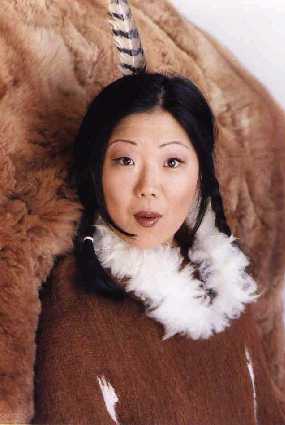
|
Editor's Note: To learn more about the people
that were strategic in getting the program "All American Girl" broadcast
on ABC, click on the below-listed links for additional background
information:
|
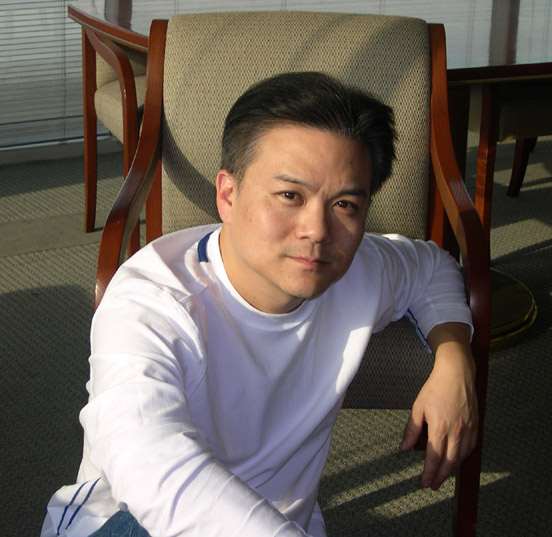 |
Music and musicals has always been an important of career. Read about his journey by clicking HERE.
Any questions regarding the content, contact Asian American Artistry
Site design by Asian American Artistry
Copyright © 1996-2009 - Asian American Artistry - All Rights Reserved.

